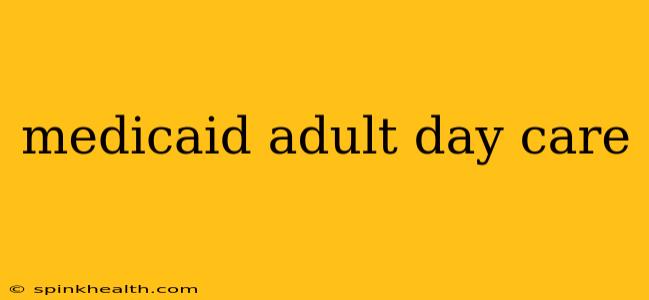The familiar anxieties of aging – the fear of isolation, the worry about managing daily tasks, the potential for a health crisis – often weigh heavily on both seniors and their families. But what if there was a supportive community-based solution that eased these burdens, providing vital care while promoting independence and well-being? That's where Medicaid Adult Day Care steps in, offering a lifeline for families and a crucial resource for our communities.
This isn't just about childcare for adults; it’s about enriching lives, fostering social connections, and ensuring the safety and well-being of vulnerable individuals. Let's delve into the heart of Medicaid Adult Day Care, exploring its benefits, eligibility criteria, and the significant impact it has on countless lives.
What is Medicaid Adult Day Care?
Medicaid Adult Day Care (ADC) programs offer comprehensive non-medical care services to adults who need supervision and assistance during the day. Imagine a vibrant hub, bustling with activity and purpose, where seniors engage in social interactions, receive personalized care, and participate in stimulating activities tailored to their abilities and interests. That’s the essence of ADC. These programs are designed to help seniors maintain their independence and quality of life while providing respite for family caregivers.
Think of it like this: while traditional nursing homes provide 24/7 care, ADC is a daytime option, allowing seniors to remain in their own homes at night. This balance – providing crucial support during the day while preserving independence and familiar surroundings – is a game-changer for many families.
Who Qualifies for Medicaid Adult Day Care?
Eligibility for Medicaid Adult Day Care varies by state, but generally, individuals must meet specific criteria. This often includes:
- Medicaid eligibility: The individual must qualify for Medicaid coverage in their state. Income and asset limits apply, and these requirements can change.
- Need for care: The individual must require assistance with activities of daily living (ADLs) such as bathing, dressing, eating, or toileting. A medical assessment is typically required to determine this need.
- Functional limitations: The individual may experience physical or cognitive impairments that limit their ability to live independently.
- Assessment by a social worker or case manager: A professional assessment helps determine the appropriateness of ADC and the level of care required.
What Services Does Medicaid Adult Day Care Provide?
Medicaid Adult Day Care isn't just about providing a safe place; it's about enriching lives. Services offered typically include:
- Socialization and recreation: Engaging activities, group games, and social interaction are vital components, combating loneliness and promoting mental well-being.
- Personal care assistance: Help with bathing, dressing, and other ADLs is provided by trained staff.
- Health monitoring: Basic health monitoring, medication reminders, and assistance with mobility are common.
- Nutritional meals and snacks: Healthy and balanced meals are usually served.
- Transportation assistance: Many programs offer transportation services to and from the center.
- Respite care for family caregivers: This crucial aspect allows caregivers a much-needed break, preventing burnout and promoting their own well-being.
How Do I Find Medicaid Adult Day Care Near Me?
The best way to find Medicaid Adult Day Care programs in your area is to contact your state's Medicaid agency or your local Area Agency on Aging (AAA). These agencies have detailed information on available programs, eligibility requirements, and application processes. They can also guide you through the process of finding a suitable program based on your specific needs.
How is Medicaid Adult Day Care Funded?
Medicaid Adult Day Care programs are primarily funded through state and federal Medicaid programs. The specific funding mechanisms vary by state, but the overall goal is to provide affordable and accessible care to eligible individuals.
What are the Benefits of Medicaid Adult Day Care for Families?
The advantages extend far beyond the individual receiving care. Families benefit significantly:
- Respite care: A vital break for family caregivers who may be experiencing physical and emotional exhaustion.
- Peace of mind: Knowing their loved one is in a safe, supportive environment reduces anxiety and stress.
- Improved quality of life for the senior: Enhanced socialization, improved health, and a greater sense of purpose positively impact the senior's overall well-being.
- Delayed nursing home placement: ADC can often delay or even prevent the need for more expensive and restrictive nursing home care.
Medicaid Adult Day Care is more than just a service; it’s a cornerstone of community support, offering a vital lifeline for both seniors and their families. By providing a supportive environment, enriching activities, and crucial respite care, it ensures that seniors can maintain their independence and dignity, while family caregivers receive the support they so desperately need. If you are caring for a loved one and are considering this type of support, don't hesitate to reach out to the relevant authorities in your region to explore the possibilities and begin the process of finding the right fit for your family.

